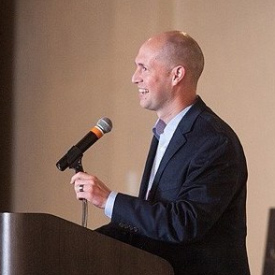Teaching, Anxiety, & “The Morning Prayer”

I begin as many days as possible with this “Morning Prayer,” which I have seen attributed to both St. Basil the Great and Metropolitan Philaret of Moscow (1782-1867):
“O Lord, grant me to greet the coming day in peace. Help me in all things to rely upon Your holy will. In every hour of the day reveal Your will to me. Bless my dealings with all who surround me. Teach me to treat all that comes to me throughout the day with peace of soul, and with the firm conviction that Your will governs all. In all my deeds and words guide my thoughts and feelings. In unforeseen events let me not forget that all are sent by You. Teach me to act firmly and wisely, without embittering or embarrassing others. Give me strength to bear the fatigue of this coming day with all that it will bring. Direct my will, teach me to pray, pray You Yourself in me. Amen.”
So much in our lives is “unforeseen,” thus the need to “rely upon (His) holy will,” to pray for “peace of soul” and “firm conviction that (His) will governs all,” and for remembrance that all things are sent by our Lord. People do not act as we wish. Time does not acquiesce to our demands, yet we seldom approach the day with these certain uncertainties in mind. We are easily thrown, and we fail to act “firmly and wisely, without embittering and embarrassing others,” preferring to force the issue. From our sleep, interrupted either too early or too late, to missed breakfasts, and slow traffic, we feel in control of so little.
Enter the teacher. It is February – that seemingly three month period during the second semester when time inches along at snail’s pace; and yet we find ourselves falling ever behind where we are “supposed” to be in the lessons. Perhaps I am being dramatic, but I am still convinced that Emily Dickinson’s poem 19 was written about school life in February:
Pain has an element of blank;
It cannot recollect
When it began, or if there were
A day when it was not.
It has no future but itself,
Its infinite realms contain
Its past, enlightened to perceive
New periods of pain.
February is one of many profound trials of our professed belief that it is better to teach a few things well than to simply finish the material; that education is about nurturing souls, not about accumulating information. Our schedules pressed, we can begin to fear conversation and contemplation, seeing them as time wasters and threats to making progress. The “rabbit trail” appears as a dark, foggy path down which we dare not venture lest we be distracted from “the point.”
But that is just February talking. It is pain with its “element of blank.” If children are souls to be nurtured, then is that not also true in February? Isn’t that their nature, even when we are behind schedule? Isn’t the rabbit trail often “the point” after all? The real need, then, is not speeding up, but seizing the day “with all that it shall bring.”
The times in which we are tempted to teach from a state of anxiety are the times in which we most need to slow down, learning to “act firmly and wisely, without embittering and embarrassing others.” That is, after all, what we do to our students when we teach from anxiety.
Spotting the difference between worthy contemplation, discussion, and rabbit trails and simply wasting time takes some wisdom, but such wisdom is gained through time and prayer (James 1:5-8), and never through anxiety. The words of our Lord apply to the classroom as well – “And which of you by being anxious can add a single hour to his span of life?”

Brian Phillips
Dr. Brian Phillips serves as a pastor in Concord, NC, where he lives with his wife and their four children.










